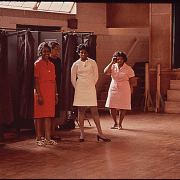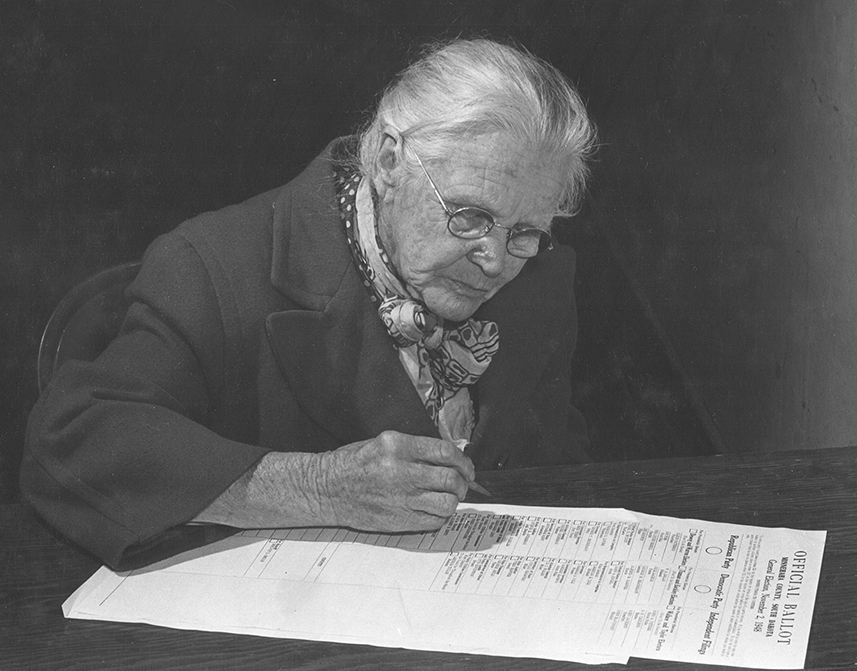
National Archives Makes Voting Happen
By Cara Moore Lebonick | National Archives News
WASHINGTON, October 4, 2022 — As Americans head to the polls this midterm election, the National Archives and Records Administration continues its history of promoting access to voting. There are a variety of ways the agency does this: encouraging voter registration through vote.gov, occasionally serving as polling stations, hosting a Voting Rights Portal, and working with voting rights organizations. These initiatives promote voting access and help fulfill our civic duties (we are big on civics here!).
Voting at the Archives
The National Archives demonstrates its dedication to increasing voting access by registering some of our locations as polling sites. The Office of the General Counsel has tracked some of the National Archives polling sites over the years, noting that the National Archives at Boston has been a polling site. The National Archives at Atlanta has served as a polling place as far back as 2012. The National Archives at Kansas City is also a regular polling station and continued this practice through, at least, 2017. Presidential libraries and museums have also served as polling sites.
“The Ronald Reagan Presidential Library and Museum has long been a favorite poll location of the voting public here in Southern California. There is an appetite from the voters to personally vote and/or bring their ballot to an election location,” said Public Programs Specialist Carol Cohea. “Out of the 50 polling centers in Ventura County, we are the most popular, and this year California has extended the time to cast ballots. And if you have to wait in a line to vote....there is no better view than the Pacific Ocean in the distance to the West and mountain views to the East.”
Voter Rights Organizations
Presidential libraries and museums also play important roles in increasing voter turnout. The Gerald R. Ford Presidential Foundation participated in non-partisan voter engagement as recently as 2020. The Ford Museum also has a relationship with the League of Women’s Voters to educate visitors on voter registration.
"Since 2018, before the fall elections, the museum partnered with the League of Women Voters to educate our visitors on how to register to vote and understand ballots. It can be less frightening to ask a question about voting at a table in a museum than doing so on election day," said Public Affairs Specialist Kristin Phillips. "President Ford would be proud that his museum is actively helping citizens find their voice to vote."
Voting Rights Portal
For those who cannot access the select field sites for their voting needs, NARA also offers virtual promotion of voting information. NARA hosts a special topics page for voting. This page is a central source for the agency’s many voting-related resources. It features vote.gov, various other landing pages with topic-specific voting sources, exhibits, primary and secondary source material, and direction to History Hub’s related inquiries. One of the additional special topics pages which discusses voting, for example, is the NARA’s African American History Page. Its Voting Rights Portal highlights records from NARA’s holdings related to the struggle to obtain voting rights and the African American vote.
These online tools help the public locate records like the Voting Rights Act, the 15th Amendment, and the 19th Amendment. It also lists numerous voting resources, such as information on U.S. voting and the election process.
Civics for All of Us
The National Archives recently launched a new education initiative, “Civics for All of US,” that promotes civic literacy and engagement. The site shares dates and information for student programs and webinars, as well as teacher workshops, to help educators encourage civic participation as young as kindergarten. Teachers can even request live, interactive distance learning with National Archives educators for groups of 10 or more students.
DocsTeach
The National Archives also offers DocsTeach, an online tool for teaching with documents, for the benefit of students and teachers alike. The site contains more than 300 diverse results of primary sources related to voting. Registered users can access more than 60 student activities for all grade levels on the topic of voting. Users also have the option of publishing new, original student activities to the site.

